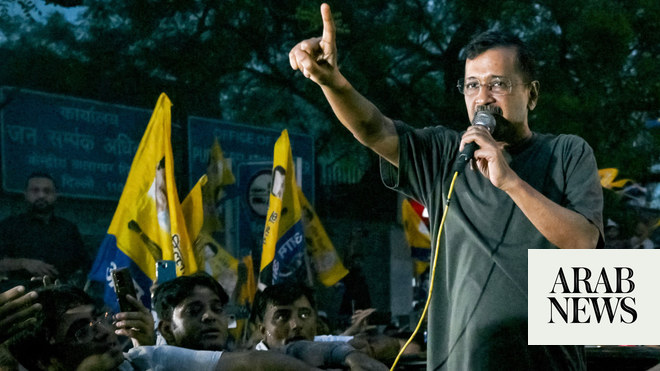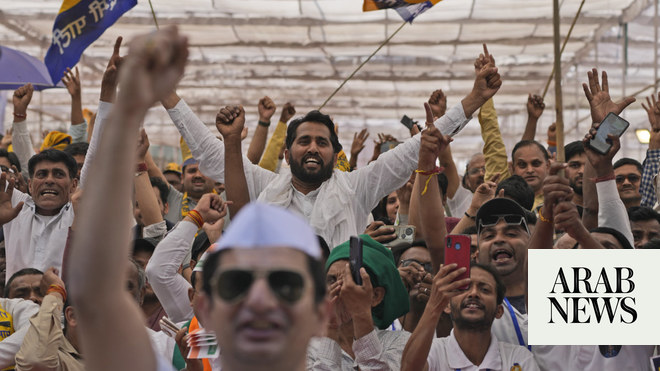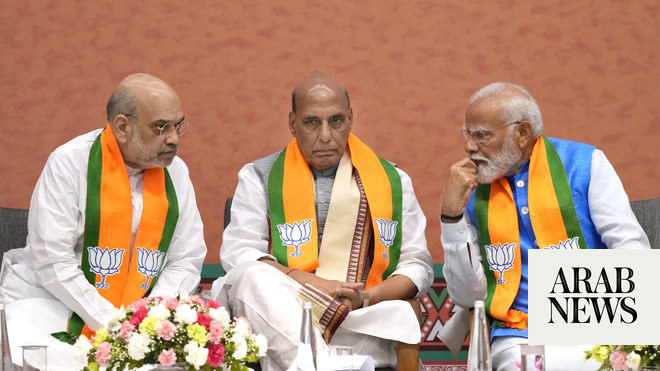
The seven-phase election, the world’s biggest democratic exercise, began on April 11 and winds up on May 19
Votes will be counted and the result announced on May 23
NEW DELHI: India"s disparate opposition parties are aiming to firm up an alliance as they sense a chance of unseating Prime Minister Narendra Modi as a staggered general election draws to a close.
The seven-phase election, the world’s biggest democratic exercise, began on April 11 and winds up on May 19. Votes will be counted and the result announced on May 23.
Modi"s Hindu nationalist Bharatiya Janata Party (BJP) went into the election as front-runner, buoyed by his image as tough and decisive after he ordered a military strike on Pakistan over a militant bomb attack in Indian-controlled Kashmir.
But his opponents have maintained their focus on farm distress and unemployment, issues that helped the main opposition Congress party defeat the BJP in state assembly elections in three rural states late last year.
Now the opposition believes the tide is turning.
"We"ve all collectively recognised the reality that the BJP is losing significant votes, therefore we are mutually exploring the formation of a cohesive and durable government that will fulfil the aspirations of India," Congress spokesman Sanjay Jha said.
He said the negotiations among opposition parties to work out a "viable alternative" to Modi"s government would be finalised before the May 23 result.
Taking the lead in preparations to take power is N. Chandrababu Naidu, the chief minister of the southern state of Andhra Pradesh, and formerly a BJP ally, according to his regional Telugu Desam Party (TDP).
Naidu has been in touch with leaders of most opposition parties, meeting some in person, TDP officials said.
Modi and other BJP leaders brush off the opposition threat.
BJP President Amit Shah goaded the opposition on Thursday to name its prime ministerial candidate, amid criticism of Congress leader Rahul Gandhi, the scion of the Nehru-Gandhi dynasty that has dominated India"s politics for much of its history since independence from Britain in 1947.
Congress"s Jha, asked if Gandhi would be candidate for prime minister, said there was "no talent deficit" in the opposition.
Congress was criticised for failing to strike an election alliance with many anti-Modi regional parties, some of them caste-based and run by politicians with much more experience than Gandhi.
They include Mamata Banerjee, the chief minister of West Bengal state, and Mayawati, a former chief minister of Uttar Pradesh state.
Naidu has been negotiating with both of them as well as the chief of the Biju Janata Dal (BJD), based in the eastern state of Odisha.
Political strategists have said that the BJD, the fifth largest party in the 545-seat lower house of parliament, could emerge as kingmaker.
The BJD has also been wooed by Modi, according to two sources with knowledge of the matter, but the party said it would only make a decision after the results are out.
TDP spokesman Lanka Dinakar said he was confident the BJD would join with the opposition.
"We have many choices to replace Modi," he said.
In some good news for Gandhi, the Supreme Court dismissed a petition filed by a BJP member seeking an investigation of suspicion he holds British citizenship.
Holding dual nationality is against the law and the government last month asked Gandhi to respond to a separate complaint on the issue filed by a BJP lawmaker.
Congress has said Gandhi is an Indian citizen by birth and that he had never held a passport of any other country.
A three-judge panel dismissed the petition on Thursday saying it had no merit.
"It just goes to show that this government"s campaign of lies will never work in the face of truth," Congress said in a message on Twitter after the ruling.












